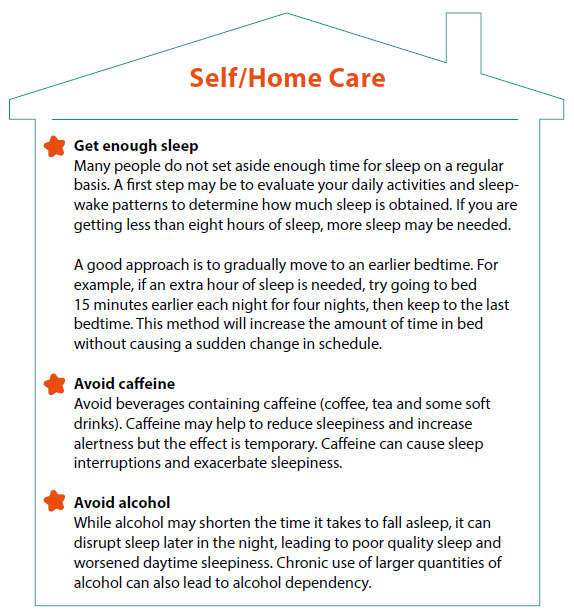What is - Excessive Daytime Sleepiness
Excessive daytime sleepiness refers to the inability to stay alert during the major awake period of the day, resulting in you falling asleep at inappropriate times.
When sleepiness interferes with daily routines and activities, or reduces your ability to function, it is considered excessive.
This is a prevalent condition. In Singapore, the prevalence of excessive daytime sleepiness has been reported to be 9 percent (Ng TP et al, Sleep Medicine 2005).

Symptoms of Excessive Daytime Sleepiness
Signs of excessive daytime sleepiness may include:
- Difficulty paying attention or concentrating at work, school or home
- Poor performance at work or school
- Difficulty in staying awake when inactive, such as when watching television or reading
- Difficulty remembering things
- Need to take naps on most days
- Sleepiness that is noticed by others
- Falling asleep while driving
Excessive Daytime Sleepiness - Causes and Risk Factors
Causes of excessive daytime sleepiness include the following. It is commonly caused by more than one of these causes.
-
Inadequate sleep
The amount of sleep needed each night varies amongst different people.
Most need seven to eight hours of uninterrupted sleep to maintain alertness the following day. A habitual sleep period of less than four to five hours daily is generally insufficient to maintain normal daytime alertness and is likely to cause excessive daytime sleepiness.
If you do not get enough sleep even on a single night, a ’sleep debt’ begins to build and increases until sufficient sleep is obtained. Excessive daytime sleepiness occurs as the debt accumulates. If you do not get enough sleep during the work week, you may tend to sleep longer on the weekends or days off to reduce your sleep debt. -
Sleep disorders
Sleep disorders such as obstructive sleep apnoea, narcolepsy, restless legs syndrome and insomnia may cause excessive daytime sleepiness.- Obstructive sleep apnoea is a potentially serious disorder in which your breathing is interrupted during sleep. This causes you to awaken many times during the night and experience excessive daytime sleepiness.
- Narcolepsy will cause excessive daytime sleepiness during the day, even after getting sufficient sleep at night. You may fall asleep at inappropriate times and places.
- Restless legs syndrome causes a person to experience unpleasant sensations in the legs. These sensations frequently occur in the evening, making it difficult for you to fall asleep, leading to excessive daytime sleepiness.
- Insomnia is the perception of poorquality sleep due to difficulty falling asleep, waking up during the night with difficulty returning to sleep or waking up too early in the morning.
-
Medications
Some medications may disrupt sleep and cause sleepiness. Examples include sedating antihistamines, sedatives, antidepressants and seizure medications. -
Alcohol
Alcohol is sedating and can, even in small amounts, make a person more sleepy and at greater risk of car crashes and performance problems. -
Caffeine
Caffeine in coffee, tea, soft drinks or medications makes it harder for many people to fall asleep and stay asleep. Caffeine stays in the body for about three to seven hours, so even when taken earlier in the day, it may cause problems in falling asleep at night. -
Nicotine
Nicotine from cigarettes is also a stimulant and makes it harder to fall asleep and stay asleep. -
Medical conditions
Chronic medical conditions such as asthma, heart failure, depression, rheumatoid arthritis or any other chronically painful disorder may also disrupt sleep and lead to excessive daytime sleepiness. Excessive daytime sleepiness may also occur following head injury and rarely, due to brain tumour. -
Sleep-wake cycle disturbance (such as shift work)
Most shift workers get less sleep over 24 hours as compared to day workers. The human sleep-wake system is designed to facilitate the body and mind for sleep at night and wakefulness during the day. These natural rhythms make it difficult to sleep during daylight hours and to stay awake during the night hours, even in well-rested individuals.
Sleep loss is greatest for night shift workers, those who work early morning shifts and female shift workers with children at home. Shift workers who try to sleep during the day are frequently interrupted by noise, light, the telephone, family members and other distractions.
Diagnosis of Excessive Daytime Sleepiness
If you feel sleepy during the day despite getting enough sleep, consult your physician who will evaluate the possible causes and advise on the appropriate management. It is important to get proper diagnosis and treatment of the underlying cause of the sleepiness. Your physician may refer you to a sleep disorders clinic for a comprehensive evaluation of your problem.
Excessive Daytime Sleepiness - Other Information
Management
Identifying the cause(s) of excessive daytime sleepiness is the key to its management. Treatment is directed towards the specific underlying cause.
Self/Home Care
- Get enough sleep
- Avoid caffeine
- Avoid alcohol

Contributed by
The information provided is not intended as medical advice. Terms of use. Information provided by SingHealth.
Condition Treated At
Department
Otorhinolaryngology- Head & Neck Surgery
Department
General Medicine




















